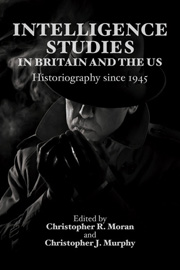Book contents
- Frontmatter
- Contents
- The Editors
- The Contributors
- List of Figures
- Preface
- Acknowledgements
- Introduction: Intelligence Studies Now and Then
- Part I AMERICAN INTELLIGENCE HISTORIOGRAPHY
- Part II BRITISH INTELLIGENCE HISTORIOGRAPHY
- 9 A Plain Tale of Pundits, Players and Professionals: The Historiography of the Great Game
- 10 No Cloaks, No Daggers: The Historiography of British Military Intelligence
- 11 The Study of Interrogation: A Focus on Torture, But What About the Intelligence?
- 12 Whitehall, Intelligence and Official History: Editing SOE in France
- 13 A Tale of Torture? Alexander Scotland, The London Cage and Post-War British Secrecy
- 14 1968 – ‘A Year to Remember’ for the Study of British Intelligence?
- 15 Their Trade is Treachery: A Retrospective
- 16 Intelligence and ‘Official History’
- Index
16 - Intelligence and ‘Official History’
from Part II - BRITISH INTELLIGENCE HISTORIOGRAPHY
Published online by Cambridge University Press: 05 October 2013
- Frontmatter
- Contents
- The Editors
- The Contributors
- List of Figures
- Preface
- Acknowledgements
- Introduction: Intelligence Studies Now and Then
- Part I AMERICAN INTELLIGENCE HISTORIOGRAPHY
- Part II BRITISH INTELLIGENCE HISTORIOGRAPHY
- 9 A Plain Tale of Pundits, Players and Professionals: The Historiography of the Great Game
- 10 No Cloaks, No Daggers: The Historiography of British Military Intelligence
- 11 The Study of Interrogation: A Focus on Torture, But What About the Intelligence?
- 12 Whitehall, Intelligence and Official History: Editing SOE in France
- 13 A Tale of Torture? Alexander Scotland, The London Cage and Post-War British Secrecy
- 14 1968 – ‘A Year to Remember’ for the Study of British Intelligence?
- 15 Their Trade is Treachery: A Retrospective
- 16 Intelligence and ‘Official History’
- Index
Summary
The extraordinary expansion of contemporary and historical intelligence studies since the mid-1970s has been both reflected and stimulated by developments in government policy, as well as academic initiative. On the government side – and we are confining ourselves here to the situation within the United Kingdom – there are two main aspects to this. First, there is the commissioning and writing of ‘Official Histories’; and, second, the release of documents. One rationale for the UK government's Official History programme is ‘to provide authoritative histories in their own right; [and] a reliable secondary source for historians until all the records are available in The National Archives’. We are not, however, going to discuss in any detail the release of intelligence records – which gained significant momentum after the Waldegrave Initiative on Open Government of 1993 – or the general writing of Official Histories – about which there is a slim literature – but, rather, the place of intelligence-related matters in the genre. Our aim in this essay is to review the place of intelligence in post-Second World War Official Histories (and some analogous productions) and the current ‘state of the art’, as represented by the recent Official (or ‘authorised’) Histories of the Security Service (MI5) and the Secret Intelligence Service (SIS).
- Type
- Chapter
- Information
- Intelligence Studies in Britain and the USHistoriography since 1945, pp. 289 - 303Publisher: Edinburgh University PressPrint publication year: 2013



